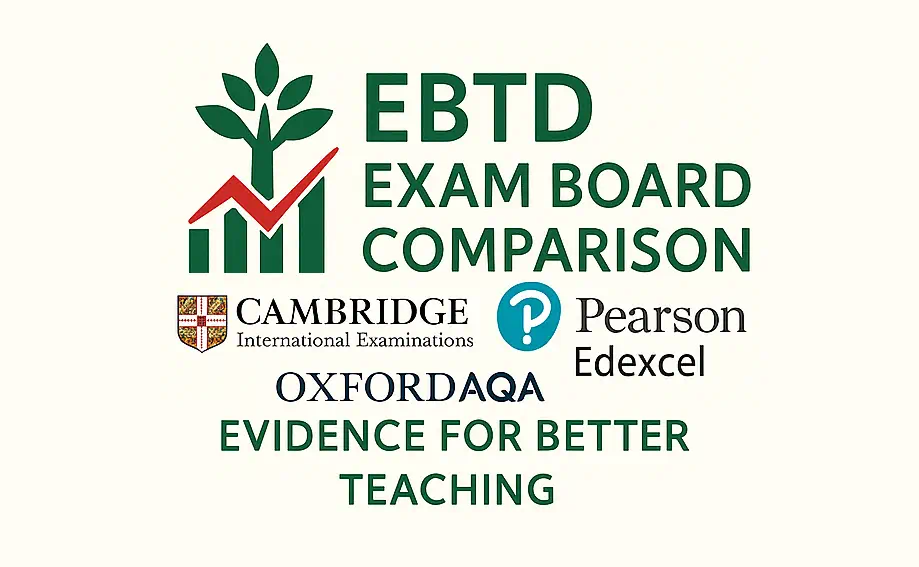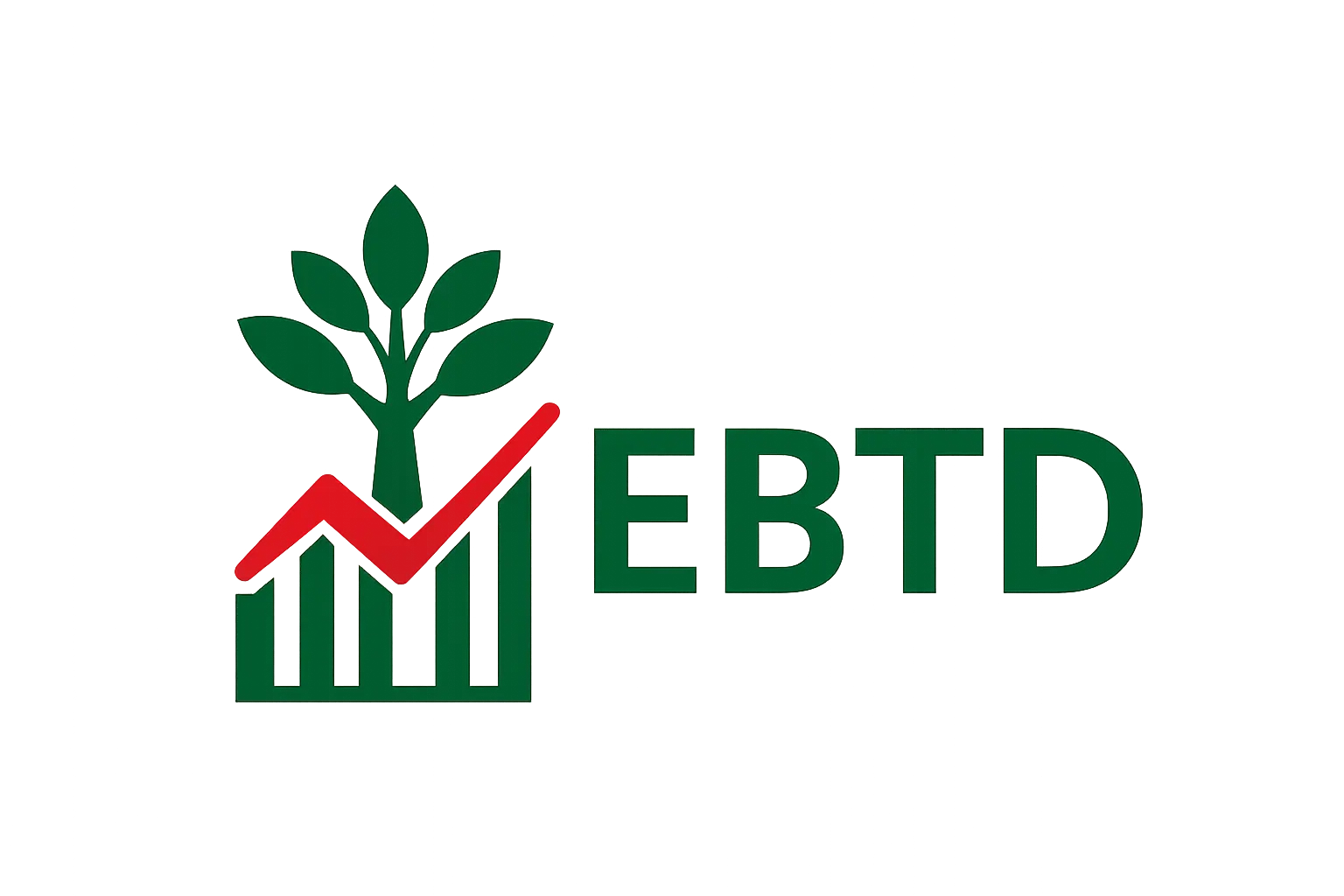
Exam Board Comparison – Grounded in Evidence
Transparent, evidence-based comparisons of Cambridge, Pearson Edexcel, and OxfordAQA for schools across Bangladesh (BD).
Understanding Exam Boards Through Evidence
The EBTD Exam Board Comparison brings together published specifications from the major international exam boards used in Bangladesh — Cambridge, Pearson Edexcel, and OxfordAQA — so teachers and leaders can view structures, assessment formats, and implications for learning side by side.
This resource does not rank or recommend. Instead, it makes the evidence visible — helping schools make context-sensitive, informed decisions aligned with their learners’ needs and curriculum priorities.
What You’ll Find on Each Subject Page
- Content & Structure – topic coverage, tiering, paper weighting
- Assessment Format – written papers, practicals/coursework, internal vs external marking
- Implications for Teaching – how structure and timing may influence pedagogy
- Implications for Students – accessibility, cognitive load, time pressure
- Opportunities – features that may support specific learning goals or school contexts
Example: Mathematics Comparison
Below is an extract from the Mathematics section of the EBTD Exam Board Comparison. Each table presents factual information drawn directly from published specifications, allowing teachers to explore how content structure, paper formats, and tiering options differ across boards.
This comparison shows how the same learning aims can be expressed through different assessment routes, helping schools plan lessons, internal assessments, and revision approaches with confidence. It’s not an evaluation or ranking — simply a transparent presentation of the available evidence.
Example Table - Maths Comparisons at a Glance
| Exam Board | Papers & Duration | Tiers | Calculator Use | Core Topics | Unusual / Additional Content | Notes for Curriculum Design | Official Page |
|---|---|---|---|---|---|---|---|
| Cambridge O Level (4024) | 2 × 2h (equal weighting) | Single tier (A*–E) | Paper 1: non-calc; Paper 2: calculator | Number; Algebra; Coordinate Geometry; Geometry; Mensuration; Trigonometry; Transformations & Vectors; Probability; Statistics | — | Plan explicit non-calculator fluency; build written/mental methods alongside problem-solving practice. | Cambridge 4024 |
| OxfordAQA IGCSE (9260) | Core: 2 × 1h30; Extension: 2 × 2h | Core (1–5); Extension (4–9) | Calculators allowed on all papers | Number; Algebra; Geometry & Measures; Statistics & Probability | — | Tiered entry invites differentiation; papers ramp in difficulty, so teach stamina and multi-step strategies. | OxfordAQA 9260 |
| Pearson Edexcel IGCSE A (4MA1) | 2 × 2h (equal weighting) | Foundation (1–5); Higher (4–9) | Calculators allowed | Number; Algebra; Geometry & Trigonometry; Vectors & Transformations; Statistics & Probability | — | Parallel pathways across tiers; frequent applied contexts encourage real-world problem-solving in lessons. | Edexcel A (linear) |
| Pearson Edexcel IGCSE B (4MB1) | Paper 1: 1h30; Paper 2: 2h30 | Single tier (target 9–4; 3 allowed) | Calculators allowed | Number; Algebra; Geometry & Trigonometry; Statistics & Probability | Sets, Functions, Matrices | Allocate time for abstract topics (functions/matrices/set notation); longer Paper 2 requires exam endurance planning. | Edexcel B |
| Pearson Edexcel IGCSE A (Modular, 4XMAF/4XMAH) | Unit 1: 2h; Unit 2: 2h (50% each) | Foundation (1–5); Higher (9–4; 3 allowed) | Calculators allowed | Same as A (Number; Algebra; Geometry; Statistics), split across units | — | Staged assessment with unit resits; pacing can be spread more evenly across the course. | Edexcel A (modular) |
Explore the subjects
- Mathematics – Non-calculator practice vs calculator-friendly routes, tiering choices, and exam timetables.
- Biology – How each board handles practical assessment, written papers, and scientific skills.
- Chemistry – Practical vs written practical assessment, content breadth, and international recognition.
- Physics – Core/Extended vs untiered routes, practical exam requirements, and recognition.
- English – First Language vs Second Language, speaking endorsements, and global recognition.
- English Literature – Text choices, coursework options, and assessment differences.
- Bangla / Bengali – Literature vs language focus, O Level and IGCSE options, and assessment approaches.
- Bangladesh Studies – History and geography of Bangladesh, unique to Cambridge and Edexcel.
- Islamic Studies / Islamiat – Contemporary issues focus (Edexcel) vs traditional Qur’an & Hadith study (Cambridge & OxfordAQA).
- Computer Science & ICT – Programming and computational thinking vs applied ICT skills and digital literacy.
- History – Modern world depth studies, optional units (e.g., WW2, Industrial Revolution), and assessment structure.
- Geography – Physical, human and environmental units; fieldwork and data-response emphasis.
- Business & Commerce – Business decision-making vs trade/commerce focus, modular and linear options.
- Art & Design – Portfolio vs timed assignment balance, specialisms (Fine Art, Graphics, Textiles, Photography).
- Economics – Micro vs macro balance, data-response and case study approaches.
- Accounting – Bookkeeping, ledgers, control processes, financial statements and adjustments.
Want a subject added next? Let us know which would help your staff most.
How to use this resource
- Department planning: align schemes of work with your chosen board’s structure and timings.
- Assessment literacy: understand where recall, application, and extended response are emphasised.
- Student support: brief students and parents on what to expect and how to prepare effectively.
- Leadership decisions: consider practical constraints (labs, timetable) alongside specification design.
EBTD’s role is to clarify, not persuade. Where differences in format or emphasis exist, they are presented transparently, based on published board documentation.
Built for Bangladesh
Many schools work with large class sizes, varied access to labs and resources, and a high-stakes exam culture. Our comparisons keep those realities in view — connecting international standards to local classrooms.
Frequently Asked Questions
Answers to common questions about the EBTD Exam Board Comparison — how it works, what it includes, and how teachers and leaders in Bangladesh (BD) can use it to make informed curriculum and assessment decisions.
What is the EBTD Exam Board Comparison?
It’s a neutral, evidence-based resource that presents published specifications from major international exam boards used in Bangladesh — Cambridge, Pearson Edexcel, and OxfordAQA — side by side. The aim is transparency, not ranking: we make differences visible so schools can make context-sensitive choices.
Which subjects are covered?
Core and elective IGCSE/O Level subjects including Mathematics, Biology, Chemistry, Physics, English, English Literature, Bangla, Bangladesh Studies, Islamic Studies, Computer Science, History, Geography, Business, Art & Design, Economics, and Accounting. New subjects are added based on teacher demand.
How is the information gathered?
All data comes directly from official, published board documentation—specifications, assessment guides, and sample papers. Each comparison table references those materials accurately and neutrally.
Does EBTD rank or recommend any exam board?
No. EBTD does not promote or endorse one board over another. The comparison highlights structural differences (content weighting, assessment type, tiering, marking) so schools can decide what best fits their context and students.
How should teachers use this resource?
Use the tables to plan schemes of work, align internal assessments, and understand exam structure when designing lessons or mock papers. It’s a tool for improving alignment, not a policy recommendation.
How can school leaders benefit?
Leaders can use the comparisons for curriculum mapping, timetable planning, and exam board selection. The data helps anticipate practical constraints such as lab resources, exam duration, or internal assessment requirements.
Why is it designed specifically for Bangladesh (BD)?
Many BD schools face large classes, mixed language backgrounds, and limited lab access. The EBTD comparison connects international standards to local realities, helping schools make evidence-informed choices that work in practice.
How are subjects analysed?
Each subject follows a common structure: – Content & Structure – topic coverage and weighting – Assessment Format – written papers, practicals, coursework – Implications for Teaching & Students – how format affects pedagogy, accessibility, and cognitive load – Opportunities – distinctive features that may support certain skills or contexts.
Can I share this with colleagues?
Yes. The comparison hub and individual subject pages are free to access and share within your school community. Citation of EBTD as the source is appreciated when sharing externally.
How often is the information updated?
EBTD reviews and updates specifications annually or when boards release new versions. The update date appears at the top of each subject page so teachers can trust the information is current.
Can I request a new subject or board?
Absolutely. Teachers and leaders can suggest subjects or qualification types for future comparison via our contact page. Requests help us prioritise what’s most useful to BD schools.
How does this link to EBTD’s wider work?
The comparison hub is part of EBTD’s Research Hub — turning evidence into practical tools for teachers in Bangladesh. It supports our training on curriculum, assessment, and leadership by providing factual background for decision-making.
How can I stay updated?
Join the EBTD Newsletter for monthly research updates, new comparison releases, and free classroom resources tailored to Bangladesh (BD).
Stay connected
Explore the full series and share with colleagues. Monthly, evidence-based updates are available via our newsletter.
